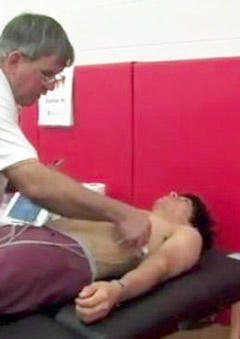fitness news
![]() ,
,![]()
Font size Sports & Medicine
Saving Young Hearts, Saving Young Athletes
– Reported, February 26, 2014
 SEATTLE, Wash. (Ivanhoe Newswire) –If your child plays sports, chances are youve worried about concussions. But did you know the number one killer of young athletes is sudden cardiac arrest? These events are often detectable and treatable.
SEATTLE, Wash. (Ivanhoe Newswire) –If your child plays sports, chances are youve worried about concussions. But did you know the number one killer of young athletes is sudden cardiac arrest? These events are often detectable and treatable.
Seventeen-year-old Carley St. George has played sports for most of her young life.
I play soccer, but I did gymnastics two years ago and I play basketball. I pretty much have done it all, Carley told Ivanhoe.
So, when Carley took a sports participation screening, she was shocked at the results.
Its a hole in my heart between my right and left atrium, Carley said.
Carley had surgery to fix her heart defect, but the problem could have been deadly. A young athlete dies from a cardiac incident once every three days in the U.S. In contrast, concussions cause just 1.5 deaths per year.
Dr. Hank Pelto says the heart events are usually brought on by a pre-existing, detectable condition.
In young folks, these tend to be congenital heart problems either of the plumbing of the heart, or the walls of the heart, or the electrical signals of the heart, Hank Pelto, MD, Family Medicine Doctor, UW Medicine, told Ivanhoe.
Most schools in the U.S. require a standard sports exam that includes listening to the heart, checking blood pressure, and reviewing family history.
However, many doctors believe adding an EKG could detect about two-thirds of the deadly heart problems that are aggravated by exercise.
A heart screening is a critical part of any pre-participation exam, Dr. Pelto said.
Tori Sorenson had an undetected heart defect. She went into cardiac arrest while playing college intramural basketball.
They had to shock me four times before they could get my heart going again, Tori Sorenson with the Nick of Time Foundation told Ivanhoe.
Today, she works with a non-profit group that offers free heart screenings at high schools.
We find somebody at each screening who has a cardiac problem, Tori said.
She wants every athlete to be screened so hearts and lives can be saved.
In other countries, most notably Italy, young athletes are required to have EKGs to play sports. Adopting the practice in the U.S. could cost between 25 to 150 dollars per test, which may not be covered by insurance.
Dr. Pelto says most of the time you can request the test if you are not offered it.
FOR MORE INFORMATION, CONTACT:
Hank Pelto, MD
Family Medicine Doctor
UW Medicine
[email protected]